If you’re in the neighborhood around the Isaac Agree Downtown Synagogue on October 12 you’re going to see people dancing in the streets carrying the Torah.
It’s an age-old tradition called Simchat Torah that celebrates the Jewish love and study of the Torah. The event is appropriately called “Dancin’ in the Streets: Simchat Torah.”

Simchat Torah means “joy of the Torah” and rejoices in the completion of the annual cycle of weekly Torah readings.On Simchat Torah, the last Torah portion is read and then the readings return to the first chapter of Genesis, reminding those of the Jewish faith the Torah is a circle and never ends.
The day is celebrated by dancing around with the Torah in a circle seven times. It can be done in the synagogue or even around the neighborhood.
Those attending the event at the Downtown Synagogue, 1457 Griswold St.,will dance around a two-block radius in the surrounding neighborhood.They will not only rejoice in returning to the beginning of Torah readings, they will also celebrate the synagogue’s role in supporting Detroit’s ongoing revitalization and its own.
Along with the city, the synagogue has experienced population decline and a lack of resources. And, like the city, it is rebuilding itself.
“We want to stay here for good and be what means to be a good neighbor,” says Rabbi Ariana Silverman, who earlier this year became the first rabbi at the Isaac Agree Downtown Synagogue in 16 years.

After the ’67 riots, like many groups, the Jewish population of the city declined as many left for the suburbs. The number of worshipers at the Downtown Synagogue dropped,and the historic four-story building it’s owned since the early 1960s fell into disrepair. Parts are even unusable. It is the last synagogue left in the city.
While the number attendees dropped significantly, the remaining worshipers have faith in their House of God. One such example is Martin Herman, who took a more active role in the synagogue after his parents passed.
“They were there when I needed them. The least I could do was be there for them,” says Herman.
When Noah Gamze, rabbi from 1962-2001, stepped down due to personal matters, Herman played a major part in passing on Judaic teaching and celebrations during the 15-year absence of rabbi. That’s right. The last synagogue in Detroit lacked a rabbi for a decade and a half.

Finally in 2016, they finally had enough money to hire Silverman, who came to Detroit seven years ago with her spouse, who took a job at Wayne State. In that time she was she has grown to care deeply for the city where she now raises her children.
“I love it,” she says, “I feel like we’ve made it our home.”
Silverman arrived just as more people started to move and recreate downtown. Many were of the Jewish faith and the synagogue grew in numbers until they had enough funds to hire her. That was only the beginning or the revitalization.
The connection to the city, and especially its Judaic present and history, strengthened. One such endeavor is the attention given to the renovation of Temple Beth El on Woodward. The building was listed on the National Register of Historic Places in 1982.
Once the largest synagogue in the city, its current resident is the Breakers Covenant Church International. Its Senior Pastor Aramis Hinds has big plans for the structure, now called the Bethel Community Transformation Center.
He reached out to Rabbi Ariana Silverman, who has been his greatest ally in transforming the building.
During “Dancin’ in the Streets: Simchat Torah” participants will dance in the neighborhood around the Downtown Synagogue at 1457 Griswold St.
The two have spearheaded the interfaith initiative they believe will result in a phenomenal comeback of this religious structure.
The church and the Downtown Synagogue are dedicated to preserving the Jewish legacy of the building. Silverman sits on the Temple Beth El board, and Herman has aided in the planning of the renovation using knowledge he obtained on the Orchestra Hall board.
The increased attendance at the Downtown Synagogue and the partnership brought services for the High Holidays,Yom Kippur and Rosh Hashanah, downtown. They were celebrated at Temple Beth El this year,linking the past, present and future of Detroit’s Jewish community.
The High Holidays usually bring an increased number of people to temple. In Detroit the number can reach 900 people.
Services for Yom Kippur and Rosh Hashanah have been held at Cobo in the past. For the last the last seven years they were held at The Holocaust Memorial Museum in Farmington Hills.
A combination of Detroit’s rebirth, Silverman’s dedication andoutlook on the city, and Herman’s faith and patience, are part of how the Downtown Synagogue is quickly becoming the heart of Jewish life in and around downtown. The Jewish presence is certainly part of Detroit’s comeback story.
As the temple prepares for a new year of Torah study, “Dancin’ in the Streets: Simchat Torah” will also usher in another year of strengtheningbonds to the city and allits people.
You can follow the Downtown Synagogue on Facebook.


